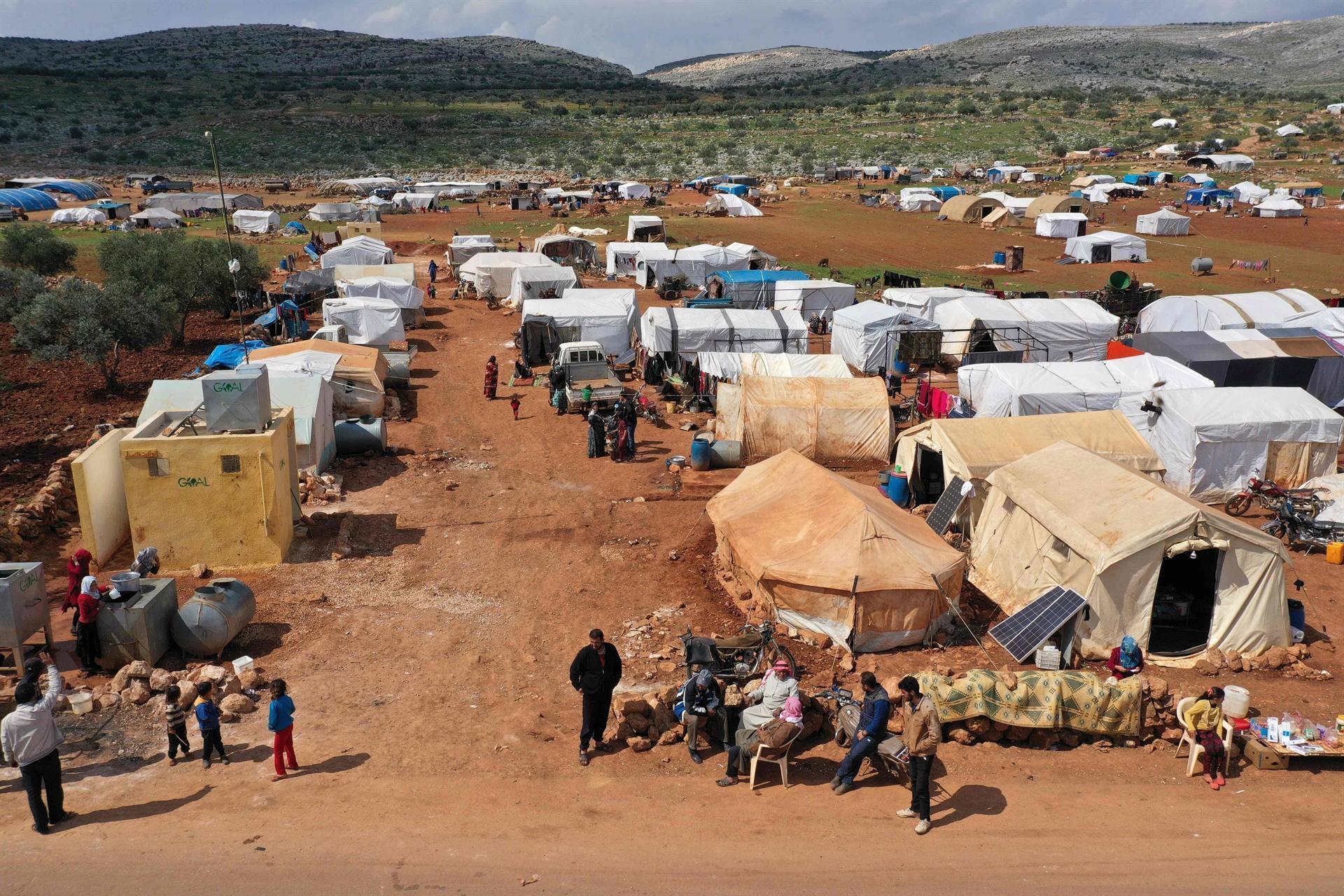
A drone image taken on March 17, 2020, shows a displaced camp in the town of Kafr Uruq southwest of the town of Sarmada in Syria's northwestern Idlib province. (AFP Photo)
German Chancellor Angela Merkel pledged further funds for Syrians in Idlib after a video conference call held with President Recep Tayyip Erdoğan, French President Emmanuel Macron and Britain’s Boris Johnson on March 17 during which they discussed the Syrian refugee crisis, Libya and the coronavirus pandemic.
“Joint action against coronavirus, resolution of Syria crisis, humanitarian assistance to Idlib, refugee flow, developments in Libya, the situation in the EU and our relations with the EU,” were the issues discussed at the meeting, Foreign Minister Mevlüt Çavuşoğlu tweeted on March 17.
The mini-summit was initially planned to take place in Istanbul but was held virtually instead because of the spread of the novel coronavirus
Following the meeting, Merkel said they will provide 125 million euros for the Syrians in Idlib. She also signaled Berlin’s green light to launch talks on upgrading the Customs Union with Turkey. European leaders called on Erdoğan to ease the pressure on the Greek border as well.
Speaking to reporters in Berlin, Merkel said they had a “very useful discussion” on the recent developments and humanitarian situation in northwestern Syria.
“Germany has earmarked 25 million euros [$27,498] plus 100 million euros [$109,994] for humanitarian assistance, and this must now quickly reach to the people,” she said, referring to millions of displaced Syrians who moved near the Turkish border due to intense attacks by the regime of Syrian President Bashar al-Assad in recent months.
The German Chancellor praised the March 5 agreement between Turkey and Russia to restore a fragile cease-fire in Idlib, after weeks-long clashes between the conflicting parties. “We very much welcome a temporary ceasefire,” Merkel said, but she also underlined the need for a sustainable cease-fire and steps to revive the talks for a political solution to the conflict.
Merkel said the leaders have also discussed the migration issues and the 2016 EU-Turkey refugee agreement, during the video conference call. “We have expressed our willingness to offer more financial support if necessary,” she said, adding that they were also aware of Ankara’s expectations in upgrading the EU-Turkey Customs Union.
Merkel said in the conversation that Erdoğan "has insisted his country will remain a member of NATO. We have also expressed our support to it and we welcomed it.”
Tens of thousands of migrants tried to get into Greece, a European Union member state, after Turkey said on Feb. 28 it would no longer keep them on its territory as part of a 2016 deal with Brussels in return for EU aid. Turkey accuses the EU of failing to honor the terms of the earlier refugee deal that stipulates funding Turkey to take back failed asylum seekers from Europe.
Turkey hosts over 3.6 million Syrians, the world’s largest refugee population, and fears that Syrian regime forces could drive another 3 million across its borders from the rebel-held Syrian province of Idlib.
The EU has called on Turkey to stop the migrants coming from Afghanistan, Pakistan, and Africa, as well as Syria, and trying to cross the border.
Greece has used tear gas and water cannon against the migrants, and both countries have sent troops or security forces to the border.
Macron’s office said there was a convergence of views on the situation in Idlib and the need to step up humanitarian aid to civilians during the conference that lasted about an hour.
But on the migrant issue, NATO and EU relations, “a number of clarifications have been requested by Europeans from Erdoğan in order to achieve clearer and peaceful relations,” the Elysee said.